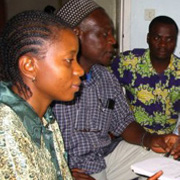By Jeremy ReynaldsSenior Correspondent for ASSIST News Service
 |
| Police chase anti-communist protestor |
BELARUS (ANS) -- On the same Sunday in January, police and local officials visited three worship services in villages in different parts of Belarus, issuing threats and warnings over what they claimed were unauthorized meetings. Court proceedings against two of their pastors might follow.
Forum 18 News Service reported that in February, police in the capital Minsk launched a mass raid on a cultural meeting being held in a pastor's home. All were meetings organised by local congregations of the Pentecostal Church.
Three Jehovah Witness communities which have been unable to gain mandatory state registration suffered raids during meetings for worship in the last quarter of 2011.
Forum 18 said Belarus imposes strict controls on exercising freedom of religion or belief without state permission. All unregistered activity is banned under the highly restrictive 2002 Religion Law, while activity by registered religious communities away from their legal address is similarly illegal.
Raid
Forum 18 said police raided a meeting to discuss historical and cultural issues in Minsk on the evening of Feb. 8. About 34 members of several Minsk Protestant churches – including Grace Church and the Church of Jesus Christ - and a small number of students who did not belong to any church were detained.
An hour after the meeting started in the house of Antoni Bokun, Pastor of John the Baptist Pentecostal Church, OMON special riot police officers – some in masks - broke in through the windows and ordered all the 55 people present, including children, to gather in one room.
Forum 18 said police explained to the detained that a police hotline had received a call informing them of a secret drug laboratory in the Pastor's house. Thirty four participants were taken to a police station, but were released two hours later without any explanation and without any official record being drawn up. (Drawing up such a record is a legal requirement.)
Dmitry Fedoruk, a Pentecostal who took part in the meeting, expressed his doubts to Forum 18 that it was a raid in search of drugs, as the officers were unarmed, and did not have forensic investigators and sniffer dogs with them to search for drugs. Without presenting identification, officers took out cameras and started to videotape.
Another member of John the Baptist Church, Boris Goretsky, told Forum 18 that besides intimidation, the purpose of the raid was to get more information about the meetings and the people who attend them.
“Though it was not a religious meeting, this one had a symbolic topic: we were to discuss a book by Belarusian writer Franciszek Alachnowicz about the punitive Soviet system,” Pastor Bokun told Forum 18. The next discussion in the series is to cover a “long expected event,” publishing the Bible in Belarusian.
“The only thing they wanted was to arrest everyone..”
John the Baptist Pentecostal Church has faced pressure in the past. Bokun was fined and detained for three days in 2007 for religious activities without state permission.
Asked if he connected the raid with his previous issues, Bokun said that the intruders gave no reason for such connection.
“We were not asked any questions and nobody answered ours,” Bokun said. “It seemed that the only thing they wanted was to arrest everyone, take passport details and then release us.”
He added that it was just like in Soviet times, when police were waiting at the door of the church taking passport details of those attending worship.
Dmitry Fedoruk, who was among those detained, told Forum 18 that at the police station those detained had a chance to pray and sing.
“The policemen were at first at a loss, then pretended that they didn't care, and finally started to feel nervous,” Bokun said. He added that many of Minsk's senior police officers were present, but none of them were able to explain to the detained church members what was going on.
Forum 18 reached the head of Moscow District Police Station, Nikolai Nazarov. He declined comment.
Complaints at police action
Sergey Khomich, Bishop of the Pentecostal Union to which John the Baptist Church belongs, said that he was shocked by the police actions.
“The meeting was within the bounds of the Church's Statute and no law was violated,” he told Forum 18. The day prior he submitted a written complaint to Aleksandr Barsukov, the head of Minsk City Police.
A formal official reply, signed by the Head of Minsk Security Police Yury Sorokin and seen by Forum 18, informed Bishop Khomich that his complaint would be not considered because he had not attached documents confirming his position. Despite this, the letter was addressed to him as Bishop of the Pentecostal Union at his Church's address.
Forum 18 said when the news organization called the Minsk City Police, the person who answered the phone refused to transfer the call to Colonel Barsukov. Forum 18 repeatedly called the Police Press Service, but each time the telephone went unanswered.
Threats, warnings
Forum 18 said three Pentecostal pastors faced problems in January for leading religious worship, which the authorities regarded as illegal. At least two of them received verbal official warnings and were required to sign official records.
On Jan. 8 in the village of Ogarevichi in Brest Region, local officials and a local police officer attended Sunday worship led by Pastor Vasili Raptsevich.
Forum 18 said two days later, Raptsevich was ordered to the police station in Gantsevichi where the Pentecostal community is registered. There he was told that he had violated the law by conducting a religious service away from its legal address without permission from the Regional Executive Committee. Ogarevichi is about four miles from Gantsevichi.
“In Ogarevichi there are about ten disabled believers who can't walk without crutches and we have been visiting them regularly for many years,” Raptsevich told Forum 18.
In 2011 the Gantsevichi Pentecostal community bought a house in the village to make it easier for the disabled church members to pray together.
“At the police station they threatened to take away the church's registration if I don't stop violating the law,” Raptsevich told Forum 18.
Though he denied all the charges - insisting that since the church bought the house it could use it for religious purposes - he was made to sign an official record. He was told that he would be summoned to court later.
Forum 18 did reach local police officer Andrei Bukato, who had taken part in the raid, but he declined comment.
Forum 18 said when Raptsevich later talked with the Deputy Head of Gantsevichi Regional Executive Committee Nikolai Volynets, he told the pastor either to apply for permission or visit the believers individually in their homes. He insisted that Raptsevich and the church had violated the law.
Volynets acknowledged to Forum 18 that Raptsevich had been warned, but explained, “It's not a question of prohibiting, but of keeping all the formalities.”
Forum 18 said on Jan. 8 in the village of Lasitsk, 28 miles from Pinsk, the authorities also attended the congregation's Sunday service.
Officials issued Pastor Anton Yatskevich with an official warning.
“There are a lot of people with different problems who need help, and as Lasitsk village is too far from Pinsk we come ourselves,” Yatskevich told Forum 18. He said that the Lasitsk congregation has fewer than twenty members, not enough to register a community.
However, Yatskevich wouldn’t blame the authorities for checking on the church's services. He said, “They get complaints from Orthodox believers and have to respond.”
Forum 18 twice called the village council, but the phone was not answered.
Also on Jan. 8, Pentecostal Pastor Viktor Kokhovets was given an official warning for leading Sunday worship in the village of Kovnyatin in Pinsk Region, the Bishop's Assistant in the Brest and Pinsk regions Fyodor Suvorov told Forum 18.
Forum 18 said the news service repeatedly called the head of the village council Konstantin Shlyazhko to find out why Khokhovets had been warned for leading religious worship, but the telephone went unanswered.
Forum 18 said police officers told Raptsevich that he would face a court hearing. However, it is unclear if that will be the case.The Bishop's assistant told Forum 18 that Kokhovets simply received a warning and no court procedures are expected “unless there are further violations.”
For a personal commentary by Antoni Bokun, Pastor of a Pentecostal Church in Minsk, on Belarusian citizens' struggle to reclaim their history as a land of religious freedom, see F18News May 22 2008
www.forum18.org/Archive.php?article_id=1131.
Jeremy Reynalds is Senior Correspondent for the ASSIST News Service, a freelance writer and also the founder and CEO of Joy Junction, New Mexico's largest emergency homeless shelter, http://www.joyjunction.org He has a master's degree in communication from the University of New Mexico, and a Ph.D. in intercultural education from Biola University in Los Angeles. His newest book is "Homeless in the City."
Additional details on "Homeless in the City" are available athttp://www.homelessinthecity.com. Reynalds lives in Albuquerque, New Mexico. For more information contact: Jeremy Reynalds at jeremyreynalds@comcast.net. |  |
** You may republish this story with proper attribution.
















